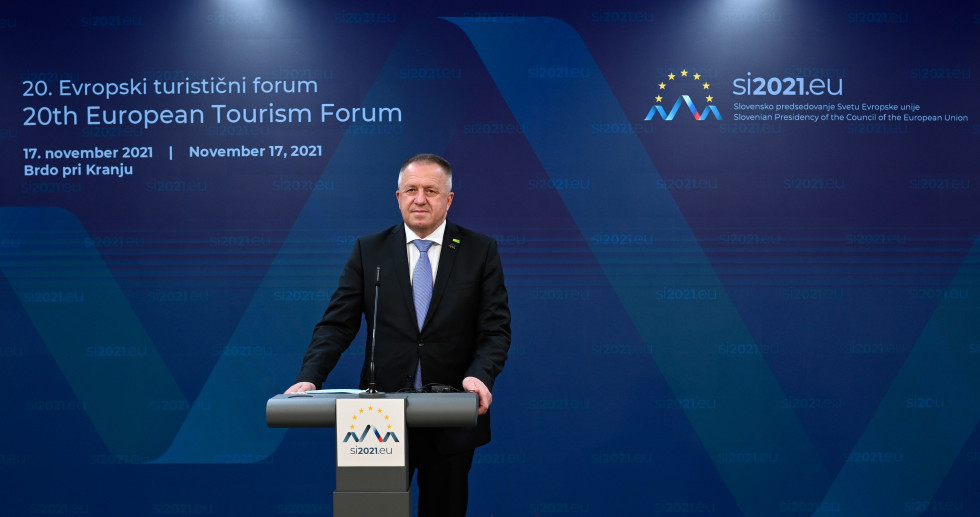The EU tourism industry and destinations on the way to sustainable and digital transitions
- Ministry of Economic Development and Technology
The participants of the 20th European Tourism Forum – stakeholders of European tourism – were welcomed by the Minister of Economic Development and Technology, Zdravko Počivalšek, the European Commissioner for Internal Market, Thierry Breton, the European Commission Director for Tourism and Proximity at the European Commission's Directorate-General for Internal Market, Industry, Entrepreneurship and SMEs, Valentina Superti, and the Vice-Chair of the European Parliament's Committee on Transport and Tourism, István Ujhelyi. The forum participants were also addressed by the Secretary-General of the World Tourism Organisation, Zurab Pololikashvili, invited as a special guest of the Slovenian Presidency.
In his opening address, Minister Počivalšek emphasised that "tourism is an important economic segment and has a high multiplier effect - both for the national and the European economy. However, it needs to become more crisis-resilient, especially in the light of the achievement of objectives of the European Green Deal, the EU's Digital Single Market and the modernised European Industrial Strategy."
The first panel presented good practices already implemented by tourism stakeholders to support the sustainable transition of EU tourism, with the aim of setting a good example and inviting other stakeholders to take similar actions. The Green Scheme of Slovenian Tourism, implemented by the Slovenian Tourist Board, was a topic of great interest and is an example of good practice not only in Europe but also globally. The tourist destination of Bohinj was presented as a sustainable destination from Slovenia. Presentations on good practice in sustainability were given by TUI and HOTREC. The first panel also highlighted the importance of training for sustainability and getting the right people to work in tourism. It was also stressed that, while developing tourism, it is important to keep in mind the quality of life of the local population.
The objectives of the second panel were mainly to examine the monitoring and documentation of developments in the tourism ecosystem. Innovative best practices at sectoral and target level tourism data collection and reporting were also presented. Representatives of Eurostat and the Statistical Office of the Republic of Slovenia stressed that statistical offices are not only data collectors and data analysts, but can also help to identify and monitor indicators of tourism's impact on the environment and local populations.
The third panel presented the benefits of digital innovation in tourism. The discussion focused on how the private and public sectors can contribute to more innovative solutions in tourism. The winning cities of the "European Smart Tourism Capital 2022" project, Bordeaux and Valencia, were presented. An interesting highlight in Valencia's presentation was the information on its public-private partnership and its tourism foundation. They work closely with airlines and jointly plan the promotion of certain destinations. Ljubljana, the capital of the country holding the EU Council presidency, which has a successful track record in digitalisation, sustainability and innovative tourism products, also featured on this panel.
Closing remarks were given by Simon Zajc, State Secretary at the Slovenian Ministry of Economic Development and Technology, and Ms Marie-Hélène Pradines, Tourism and Textiles Head of Unit at DG GROW of the European Commission. State Secretary Simon Zajc thanked all the organisers and participants of the European Tourism Forum, saying, "I firmly believe that the discussions at today's 20th European Tourism Forum will be a great success. The European Tourism Forum has given new impetus to our further cooperation and work towards a climate-neutral, smart and innovative, responsible and inclusive tourism of the future, which will maintain Europe as a destination at the forefront of the global tourism market in the long term."


